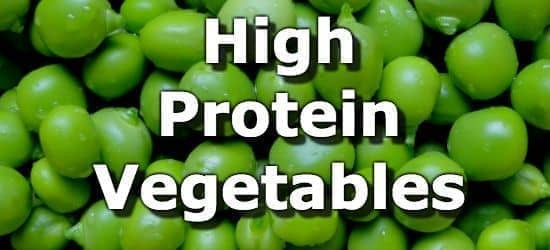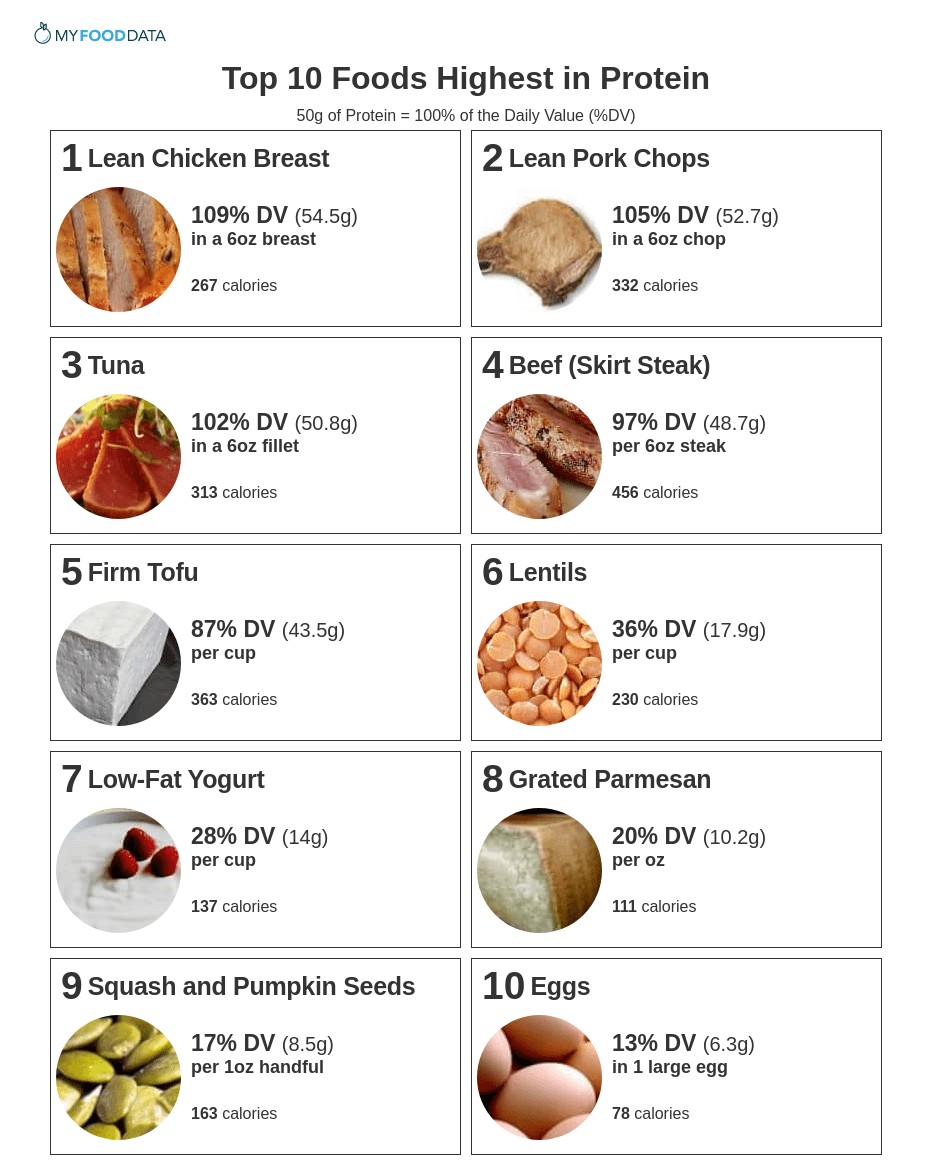Protein is an essential macronutrient vital for building and repairing tissues, making enzymes and hormones, and supporting overall health. For those looking to maximize their protein intake efficiently, understanding which foods offer the highest protein content per 100 grams is crucial. This guide, powered by USDA nutrition data, will explore the top 10 Highest Protein Foods Per 100g, offering valuable insights for athletes, fitness enthusiasts, and anyone aiming to boost their protein consumption.
Discovering the Top Protein-Rich Foods
When evaluating protein content, nutrient density is key. This refers to the amount of protein relative to the food’s weight. Focusing on foods with the highest protein foods per 100g allows you to optimize your protein intake without excessive calorie consumption. Let’s delve into the top contenders:
Top 10 Protein Food List (Per 100 Grams)
| Food | Protein Content (per 100g) | % Daily Value (DV) |
|---|---|---|
| 1. Spirulina | 57.5g | 115% |
| 2. Dry-Roasted Soybeans | 43.3g | 87% |
| 3. Grated Parmesan Cheese | 41.6g | 83% |
| 4. Lean Veal Top Round | 36.7g | 73% |
| 5. Lamb Shoulder Roast | 35.5g | 71% |
| 6. Lean Chicken Breast | 32.1g | 64% |
| 7. Non-Fat Mozzarella | 31.7g | 63% |
| 8. Lean Pork Chops | 31g | 62% |
| 9. Tuna | 29.9g | 60% |
| 10. Squash and Pumpkin Seeds | 29.8g | 60% |


This table highlights foods that are nutritional powerhouses when it comes to protein. It’s important to note that the Daily Value for protein is based on a 2,000 calorie diet and may vary depending on individual needs and activity levels.
Exploring High Protein Isolates and Powders
Beyond whole foods, protein isolates and powders represent concentrated sources of protein. While these are often processed, they can be convenient for supplementing protein intake, especially for those with high protein needs or specific dietary requirements. Here are some non-commercial options showing protein per tablespoon:
| Food | Serving | Protein Content (per tbsp) | % Daily Value (DV) |
|---|---|---|---|
| 1. Soy Protein Isolate | 1 tbsp | 6.2g | 12% |
| 2. Gelatin | 1 tbsp | 6g | 12% |
| 3. Egg White Powder | 1 tbsp | 5.9g | 12% |
| 4. Spirulina (Dried Seaweed) | 1 tbsp | 4g | 8% |
| 5. Non-fat Milk Powder | 1 tbsp | 2.7g | 5% |
| 6. Whey Powder | 1 tbsp | 1g | 2% |
These isolates and powders can be easily added to smoothies, shakes, or recipes to increase protein content. However, it’s essential to consider the overall nutritional profile and processing methods when incorporating these into your diet.
Protein Sources for Vegetarian and Vegan Diets
Meeting protein requirements is entirely achievable on vegetarian and vegan diets by strategically including highest protein foods per 100g from plant-based sources.
Vegetarian Protein Sources: Vegetarians can enjoy a wide variety of protein-rich foods, including dairy and eggs, in addition to plant-based options. Excellent choices include tofu, lentils, beans, yogurt, cheese, milk, eggs, nuts, seeds, green peas, whole grains, and even mushrooms like white button mushrooms.
Vegan Protein Sources: Vegans focus solely on plant-derived protein. Key highest protein foods per 100g for vegans are tofu, tempeh, beans, lentils, nuts, seeds, and certain vegetables. High protein vegetables for vegans include lima beans, spinach, and corn, although they generally contain less protein per 100g compared to the top sources listed earlier.
High Protein Meal Ideas to Incorporate Top Protein Foods
Creating balanced, high-protein meals is easier when you know which foods pack the most protein. Here are some meal ideas incorporating some of the highest protein foods per 100g:
-
Tuna Sandwich: A classic for a reason, tuna is a lean protein source. Combine 3oz canned tuna with romaine lettuce and tomato on whole wheat bread for a quick and protein-packed lunch.
Nutrient Amount % Daily Value Calories 276 14% Protein 28.4g 57% Fat 4.7g 7% Carbs 28.5g 10% -
Banana Parfait: Start your day with a protein boost. Layer non-fat yogurt with oats, pumpkin seeds (another of the highest protein foods per 100g), and banana for a nutritious and satisfying breakfast or snack.
Nutrient Amount % Daily Value Calories 420 21% Protein 16.4g 33% Fat 17g 26% Carbs 57g 19% -
Chicken Salad: Utilize lean chicken breast, one of the top protein sources. Mix 6oz chicken breast with romaine lettuce, cherry tomatoes, and grated Parmesan cheese for a flavorful and protein-rich salad.
Nutrient Amount % Daily Value Calories 429 21% Protein 65.1g 130% Fat 14g 22% Carbs 12.9g 4% -
Tofu Stir Fry: A vegan-friendly option packed with protein. Stir-fry firm tofu with onions, broccoli, ginger, brown rice, and sesame oil for a complete and high-protein meal.
Nutrient Amount % Daily Value Calories 680 34% Protein 51.1g 102% Fat 37.1g 57% Carbs 47.5g 16% -
Lentil Curry with Peanuts: Combine lentils and peanuts, both good sources of protein, in a flavorful curry. Serve with brown rice for a hearty and plant-based high-protein meal.
Nutrient Amount % Daily Value Calories 672 34% Protein 28.8g 58% Fat 30.4g 47% Carbs 77.8g 26%
These meal examples demonstrate how to easily incorporate highest protein foods per 100g into your daily diet. You can further customize these meals or create your own using a nutrition calculator to track your macronutrient intake.
Utilizing Nutrient Ranking Tools for Personalized Protein Lists
To explore a wider range of foods and create your own personalized lists based on protein content or other nutrients, leverage nutrient ranking tools. These tools allow you to compare foods and identify those that best meet your specific dietary needs.
MyFoodData offers a nutrient ranking tool and a nutrient ratio tool to help you delve deeper into food composition and make informed dietary choices.
Conclusion: Prioritizing Protein-Rich Foods for Optimal Health
Understanding the highest protein foods per 100g empowers you to make strategic food choices to meet your protein requirements efficiently. Whether you are an athlete, following a vegetarian or vegan diet, or simply aiming to increase your protein intake, incorporating these protein-rich foods into your meals can contribute significantly to your overall health and wellness. Remember to consider variety and balance in your diet for optimal nutrition.
Data Sources and References:
- USDA National Nutrient Database for Standard Reference
Simplify Nutrition Tracking with MyFoodData!
Speedy Tools and Detailed Data FREE Easily analyze your meals to find the best foods for your goals.
✅ Use our recipe nutrition calculator and nutrition comparison tool.
✅ Access expert nutrition data tools and in-depth articles.
✅ Log foods and organize your recipes with a free account.
